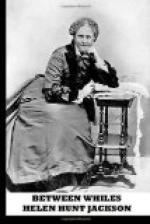The truth was, Katie had been in love with Donald ever since she was ten years old and he was twenty,—a long time, seeing that she was now thirty and he forty; and never once, either in their youth or their middle age, had there been a word of love-making between them. All the same, deep in her heart the good little Katie had kept the image of Donald in sacred tenderness by itself. No other man’s love-making, however earnest,—and Katie had been by no means without lovers,—had so much as touched this sentiment. She judged them all by this secret standard, and found them all wanting. She did not pine, neither did she take a step of forwardness, or even coquettish advance, to Donald. She was too full of Scotch reticence for that. The only step she did take, in hope of bringing him nearer to her, was the going to Charlottetown to learn the milliner’s trade.
Poor Katie! if she had but known she threw away her last chance when she did it. She reasoned that Donald was in Charlottetown far more than he was anywhere else; that if she stayed at home on the farm she could see him only by glimpses, when the “Heather Bell” ran in at their landing,—in and out and off again in an hour. What was that? And maybe a Sunday once or twice a year, and at a Christmas gathering. No wonder Katie thought that in the town where his business lay and he slept three nights a week she would have a far better chance; that he would be glad to come and see her in her tidy little shop. But when Donald heard what she had done, he said gruffly: “Just like the rest; all for ribbons and laces and silly gear. I thought Katie’d more sense. Why didn’t she stay at home on the farm?” And he said as much to her when he first saw her in her new quarters. She tried to explain to him that she wanted to support herself, and she could not do it on the farm.
“No need,—no need,” said her relentless cousin; “there was plenty for all on the farm.” And all the while he stood glowering at the counter spread with gay ribbons and artificial flowers, and Katie was ready to cry. This was in the first year of her life in Charlottetown. She was only twenty-two then. In the eight years since then matters had quieted down with Katie. It seemed certain that Donald would never marry. Everybody said so. And if a man had lived till forty without it, what else could be expected? If Katie had seen him seeking other women, her quiet and unrewarded devotion would no doubt have flamed up in jealous pain. But she knew that he gave to her as much as he gave to any,—occasional and kindly courtesy, no less, no more.
So the years slipped by, and in her patient industry Katie forgot how old she was growing, until suddenly, on her thirtieth birthday, something—the sight of a deepened line on her face, perhaps, or a pang of memory of the old childish past, such as birthdays always bring—something smote her with a sudden consciousness that life itself was slipping away, and she was alone. No husband, no child, no home, except as she earned each month, by fashioning bonnets and caps for the Charlottetown women, money enough to pay the rent of the two small rooms in which she slept, cooked, and plied her trade. Some tears rolled down Katie’s face as she sat before her looking-glass thinking these unwelcome thoughts.




